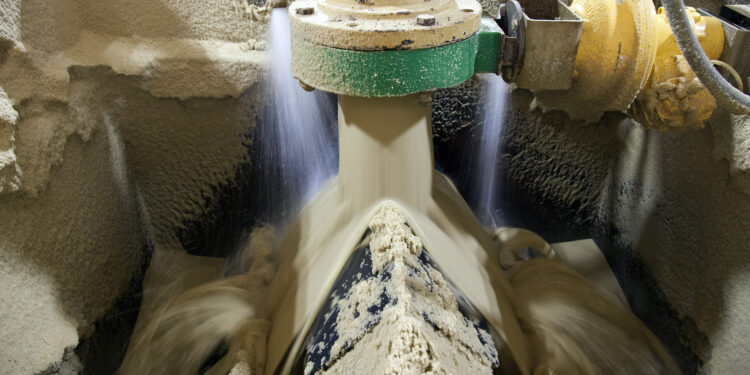Al -Jazeera Net Correspondents
BaghdadThe industrial sector in Iraq is a basic pillar of sustainable economic development and diversification of national income sources. In this context, investment in silica is highlighted as a promising opportunity to revive local industries and attract foreign investment, taking advantage of the huge reserves the country possesses from this strategic raw material.
In confirmation of this trend, the Iraqi -Saudi relations witnessed a remarkable development represented in signing a cooperation agreement between the General Company for Glass and Iraqi Varieties and the Saudi Generations Company on April 29, with the aim of establishing the largest integrated industrial complex for silica projects in Anbar province in western Iraq.
Industrial edifice
Silica is gaining strategic importance as it enters as an essential raw material in many advanced global industries, starting with all kinds of glass industry, through the industry of thermstone and plumbing, and reaching micro silicon industries, communications devices, and to pharmaceutical industries. In this context, Iraq has a great competitive advantage for having abundant and high reserves from silica, concentrated in the provinces of Najaf and Anbar.
The Director General of the General Company for Glass at the Ministry of Industry and Minerals, Hamid Mohamed Kudi, confirmed in his speech to Al -Jazeera Net that the choice of Anbar Governorate to establish this complex was not a coincidence, but rather came based on the availability of a large stock of high -purity silica, in addition to the accumulated experiences of Iraqi cadres in the field of dealing with this article.
Kody explained that the project is still in its early stages, as the necessary studies are currently being prepared to establish an industrial complex on an area of 800 dunums, and it is expected to be completed within 3 years. He added that the project will not be limited to silicone production, but will also include a factory to produce flat glass with a capacity of 700 tons per day, as well as channels for bodies and tractor with an initial capacity of 200 tons per day, which can be increased to 800 tons, in addition to a factory dedicated to the production of medical channels with a capacity of 120 tons per day, to serve the health sector in Iraq.
On the economic and social impact, Kodi explained that the project will provide between 5 thousand to 10 thousand job opportunities for the people of Anbar province and graduates of Iraqi universities in various specialties. The project will also contribute to increasing the company’s revenues and the ministry, and raising the contribution of the industrial sector to the gross domestic product. The construction of an electrical energy complex is currently being planned to feed factories, as well as integrated residential complexes, which opens the door to large -scale urban and economic development in the desert areas of Anbar.
Cody pointed out that the complex will be a base for the development of transformative industries that depend on its outputs, such as the manufacture of glass panels, silicone, sodium silicate, car glass, and solar panels, expected to reach the number of final products to 12 products after the completion of the project.
Huge reserves in Najaf and Anbar
For his part, Abdul Hassan Al -Ziyadi, a member of the Iraqi Businessmen Federation, stressed that silica represents a pivotal material in developing modern industries globally. In his statement to Al -Jazeera Net, he affirmed that Iraq has large reserves of this article, especially in the governorates of Najaf and Anbar, where the sand is available with high -quality specifications, suitable for the manufacture of glass and colored glass.
He explained that the reports of the Geological Survey Authority indicate that there are 220 million cubic meters of sand suitable for the glass industry in Najaf, in addition to 385 million cubic meters for the manufacture of stained glass. In Anbar, deposits are concentrated in the areas of Al -Ara, Wadi Al -Aju, and Sadma, west of the city of Al -Rutba, where the reserves are estimated at more than 330 million cubic meters.
Al -Ziyadi also revealed an additional reserve discovery estimated at one billion tons of high -purity glass sands (the percentage of purity of up to 99%), which is qualified to enter accurate and advanced industries of high added value. He pointed out that this resource remained marginalized for many years due to the political and security situation, and that it is time to adopt an economic vision that puts this sector at the forefront of development plans.
He stressed that the manufacture of silica inside Iraq instead of exporting it as a raw material will create an added economic value, generate huge revenues, and supports technical industries, especially in light of the rapid global growth in silicone uses.
Smith investment attractiveness
As for the economist Mustafa Hantoush, he stressed that Anbar has huge reserves of silica, which makes it one of the largest regions of the Middle East in this field. He pointed out that Saudi investments reflect the attractiveness of Iraq as a promising investment destination, considering that the flow of capital enhances economic stability and opens the horizons of employment and development.
Hantoush stressed that Iraq has huge opportunities for both local and foreign investors, but it needs to create a stimulating investment environment, starting to facilitate the procedures for granting licenses, providing loans, and providing tax exemptions.
At the same time, he pointed out that one of the most prominent challenges facing the silica sector is to control imports and support local products, as well as the need to improve industrial infrastructure.
He concluded by saying: “To meet the requirements of foreign and local investment is not a luxury, but rather a strategic necessity to revive the Iraqi economy, transfer industrial and technical experiences inward, and achieve sustainable development.”



